|
|
 |
|
RPGs tend to be the games that still thrive on systems well into the overlap of a new generation of consoles, and while this last generation is in its twilight, there are still quite a few RPGs on the horizon. But we weren't going to let that stop us from celebrating our favorite console games of the past generation to date. There are plenty of great games, but for the focus of this feature we're simply highlighting some of our favorite console (and PC) RPGs, not the best, since 2006. - Michael A. Cunningham
|

Dragon Age: Origins
By: Becky Cunningham | Platform: PS3/Xbox 360/PC | Released: 11/3/2009
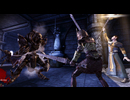
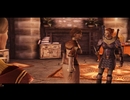
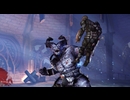
I have loved many games this generation, so I chose to go with the game that managed to get me more personally involved than any before or since. There was just something about the human noble story in Dragon Age: Origins. For the first time, I felt compelled to truly role-play my custom character from the beginning, launching myself into an epic tale of ambition and revenge that far surpassed the game's main goal of going after the Archdemon. (Warning: Serious DA:O spoilers ahead!)
My (female) noble's main goal was to regain all that she had lost due to Rendon Howe's betrayal of her family, and then some. She was immediately attracted to the charming Alistair, but when she learned of his lineage, I formed a plan for her to become the Queen of Ferelden. Mind you, I didn't even know if it was possible to do so, but I somehow managed to set everything up right, lining up all my chess pieces so that Alistair was in line for the throne and I was right there by his side.
Until...the demon baby scene. I personally couldn't stand Morrigan and reflexively chose to turn her down when she first presented me with her "plan." Players who have taken a similar route through the game know that choice doesn't end well for ol' Alistair, and when he flung himself at the Archdemon in order to save my character's life, I actually screamed, "NOOOOOO, THIS IS NOT HAPPENING!" and hit the reset button on my computer. Reloading to the point just before Morrigan approached my character, I realized that it was actually the best role-playing choice to take her up on the offer. My character had come too far and worked too hard to let a bit of squeamishness stand between her and the throne.
Lots of RPGs have endeared themselves to me with great stories, memorable characters, and fun battle systems, but Dragon Age: Origins remains the only game that has ever caused me to react so emotionally to its goings-on. For me, the ultimate goal of a role-playing game is to be able to inhabit a character that fully, and BioWare gets major kudos for pulling that off.
Honorable Mentions:
- Tales of Vesperia
- Tales of Xillia
- The Witcher 2
- Little King's Story
- Xenoblade
- Atelier Ayesha
- The Elder Scrolls V: Skyrim
- Rune Factory Frontier
- Bastion
|

Xenoblade Chronicles
By: Alex Fuller | Platform: Wii | Released: 4/6/2012
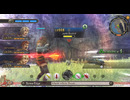
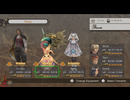
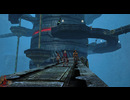
While many RPGs have come and gone this generation, offering various strengths, few have really been the complete package. There haven't been too many offering the best of both worlds in terms of letting players explore a massive world and backing it with a stellar tale. Xenoblade Chronicles offered everything that I look for in an RPG: fun gameplay, a great cast, an engaging story, and a fascinating and beautiful setting. The setting really is one of most gorgeous and stunning ones around, and it was always enjoyable to explore if for no other reason than to glimpse some of the awesome views. The game shows that RPGs don't need to be restrictive to tell a great story, nor does exploration and world-building need to force the main narrative to the back. Also, the soundtrack is pure awesome.
Honorable Mentions:
- Tales of Vesperia
- Valkyria Chronicles
- Resonance of Fate
- Mass Effect
- Dragon Age: Origins
- Fallout 3/New Vegas
|

Bastion
By: Trent Seely | Platform: PS3/Xbox 360/PC/Mobile | Released: 7/20/2011
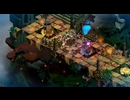
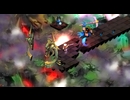
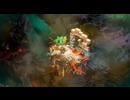
While this generation has provided many stand out RPGs from big-name developers, we can't overlook the equally impactful classics with more humble origins. Bastion is one such game. I don't hesitate in calling Supergiant Game's two-year-old action RPG a classic, as I feel its aesthetics, tone, and design choices will stand the test of time. In an age where revision is more commonplace to the RPG landscape than innovation, Bastion opts to be different. The game's set-pieces are put in place through narration, a unique approach which both strengthens the colorful setting and informs the player's choices without feeling too overbearing. Gameplay is delightfully customizable and varied, the stakes of your tale are high, and the overall experience feels very rewarding. A vivid isometric art style and inspired sound design help immerse you in a post-Calamity world and add character to Bastion, which I'd argue is unmatched by most modern RPGs with the biggest of budgets. This is the kind of video game that gives credence to the idea that games can be art. I was first attracted to Bastion because it echoed some of the things I adored about Secret of Mana. I stayed, however, because it embraced all of the ways it was different.
Honorable Mentions:
- Costume Quest
- Evoland
- The Elder Scrolls V: Skyrim
- Dust: An Elysian Tale
- Cthulhu Saves the World
- Lost Odyssey
|

Demon's Souls
By: Adriaan den Ouden | Platform: PS3 | Released: 10/6/2009
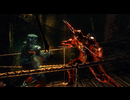
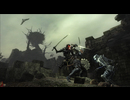
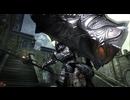
One of the biggest and best surprises of this generation of games came from an unexpected source: the relatively obscure Japanese developer From Software, whose prior claim to fame came from games like Enchanted Arms, Armored Core, and King's Field. However, in 2009, the gloomy, atmospheric, and brutally difficult Demon's Souls arrived on the PlayStation 3, and in an instant, From Software became a developer on everybody's mind while the game itself went on to win numerous Game of the Year awards, including RPGamer's 2009 Editor's Choice award.
My own experiences with Demon's Souls are numerous and memorable; I remember watching myself get impaled for the first time during a demonstration at Atlus's headquarters during RPGamer's 2009 Run to the Sun event. I remember taking home an imported Chinese edition of the game, already entirely in English, and being amazed that nobody had brought it over sooner. I remember Atlus's PR Guru Aram Jabbari invading my game and attempting to kill me on the pre-release press servers. And I remember writing my review, purchasing a retail copy, and immediately beginning the game anew because it was just that good.
While much of what made Demon's Souls great would later find its way into the game's spiritual successor Dark Souls, one aspect of its design was so utterly unique and successful at the time that it has inspired countless other games in a similar direction: it's multiplayer functionality. Unlike most online games, players in Demon's Souls rarely interact directly with one another. Instead, players are given glimpses into other players' activities through bloodstains on the ground — terrifying warnings of dangers that may lie ahead — or glowing messages left for those who would heed their warnings. With these systems, From Software turned what would otherwise be a single player game into an amazing social experience that left you feeling isolated, but never alone. It's a design philosophy that has been successfully adapted for a number of other prominent RPGs, including Persona 4 Golden, The Legend of Zelda: The Wind Waker HD, and Pokémon X & Y.
While certain upstarts among RPGamer staff will argue Dark Souls' superiority over Demon's Souls (though they are wrong), there is still one thing they cannot deny: Demon's Souls is what started it all. It's a fantastic experience and one of the most important and influential games of this generation.
Honorable Mentions:
- The Elder Scrolls V: Skyrim
- Mass Effect (series)
- Borderlands (series)
- Nier
- Tales of Xillia
- Bastion
- Little King's Story
- Diablo III
|

The Elder Scrolls IV: Oblivion
By: Emanuel Merino | Platform: PS3/Xbox 360/PC | Released: 3/20/2006
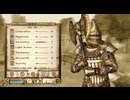
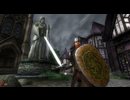
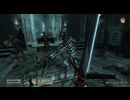
When I think of the games that had the greatest impact on me this generation or those that I simply spent the most time playing, I instantly think of Bethesda's big open-world RPGs, namely The Elder Scrolls and Fallout series. It's nice to see that Fallout is well represented on this list, so that allows me to focus on Bethesda's first big RPG of the last generation, The Elder Scrolls IV: Oblivion.
Oblivion was released on the Xbox 360 when the console was still relatively new and gamers were clamoring for new games to play. Thanks to it landing in the midsts of a dry spell of new releases and having received rave reviews and positive word of mouth, Oblivion exploded and reached new heights of popularity that the previous entries never saw. As a result, this game ended up being many gamers first experience with Bethesda Games, open-world RPGs, and the first real "Next-Gen" RPG experience for many console gamers, myself included.
A breath of fresh air after years of only playing JRPGs, I loved the freedom of being able to just pick a direction on the map and discover new places, monsters, and adventures along the way. The fast travel system meant that I was never afraid to wander off the beaten path and simply explore this massive and vibrant world. The helpful quest log kept track of everything that I needed to remember to do and meant that I could jump back in and play even after taking month or year long breaks from the game. Honestly, it took me a couple years to see and do everything in Oblivion including its fantastic DLC packs, The Shivering Isles and Knights of the Nine, but with the quest log and achievement system, I always knew what I needed to do. Speaking of achievements, Oblivion was a game that was actually made better by the incorporation of Xbox Live achievements. These created a clear and easier to way to understand the path line through all of the game's major quests, side quests, and Faction quests.
The other big take away from Oblivion is that it was one of the first RPGs I played where I really felt that I was creating a character based on my personality, how I liked to play games. I didn't worry about rigid class structures or what my character would do or want. In Oblivion I was the Hero of Kvatch, a Redguard, magic-wielding, lock-picking, master thief with a massive two-handed sword and a bad gambling habit. That's what I enjoyed about it, freedom of expression not just in cosmetic character creation, but in how I actually play the game and approached situations.
The most important aspect of this game is how I have come to expect many of the quality of life game mechanics popularized in Oblivion to be in all other open-world games, not just RPGs. I want an easy to understand and smartly updated quest log. I want fast travel systems that encourage exploration. I want to create a character that is unique to me and my play styles. While Oblivion is hard to go back to now that Fallout 3 and Skyrim are out (among other quality open-world and Western RPGs), this is the one that I feel created my love affair with the genre last gen, even more so than The Elder Scrolls III: Morrowind. Oblivion came out on the right console at the right time.
Honorable Mentions:
- Fallout 3
- Mass Effect
- Mass Effect 2
- Fallout: New Vegas
- Diablo III
|

Nier
By: Glenn Wilson | Platform: PS3/Xbox 360 | Released: 4/27/2010
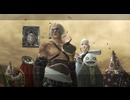
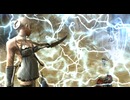
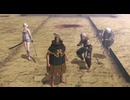
While a list of a generation's favorite games will usually contain those that were the most fun to play, Nier's brazen attempts at breaking what it means to be an RPG resulted in an inconsistent experience that was at times a masterpiece, at others incredibly dull, and at others extremely frustrating. It was shocking, memorable, and unique in so many ways that I have to consider it one of my favorite gaming experiences of this generation, and one of the few must-try titles just due to the originality.
The game opens with a black screen as a woman's voice angrily screams profanities and plot spoilers at the player, and never quite gets normal after that point. The writing is outstanding, the characters are fascinating, and the way the dialogue alternates between extreme offensiveness, silliness, and tragedy is unreal. Nier is at times an action RPG, at others a bullet hell dodge-a-thon, and at one point the screen slowly fades to black and becomes an interactive novel. Most memorable to me, though, are the music and the endings. It has my favorite in-game score and is the only video game soundtrack from this generation I purchased and listened to frequently. As a hater of all things new game plus, Nier got me to replay the new game plus portion twice to see the added, meaningful cutscenes. The true ending is a personal, heart-wrenching moment that also breaks the rules of video games and concludes one of my favorite tales from this generation.
Nier isn't for everyone, sadly, not due to its strangeness but due to its many gameplay weaknesses. It often feels like you're playing a game made by designers who don't know what exactly a modern video game should be, which works to its detriment just as deeply as its favor. Looking back, I am wont to recalling its multiple jaw-dropping moments. While other games were more fun to play, I've forgotten the details of many of them. I'll remember Nier forever.
Honorable Mentions:
- The Witcher 2
- Fallout 3
- Fallout: New Vegas
- Little King's Story
- Dragon Age: Origins
- Mass Effect 2
- Atelier Totori
- Bastion
|

Dark Souls
By: Michael Apps | Platform: PS3/Xbox 360/PC | Released: 10/4/2011

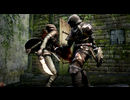
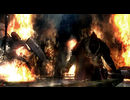
I gave Dark Souls a 4.5/5 when reviewing it, so it will only take one look at that to know I thought it to be a fine game. However, it wasn't until I put another eighty hours or so into the game that I fully comprehended just how good a game Dark Souls truly is. A spiritual successor to the brilliant Demon's Souls, Dark Souls kept the tight challenging combat, punishing difficulty, tense battles, and innovative boss fights while refining them all. What it did far and away better than its predecessor though, is level design.
Demon's Souls gave you a central hub to explore five different areas, each with several levels to explore. Dark Souls ditches this in favor of a carefully constructed world with areas that are connected in various ways. It will only take a brief amount of play time to recognize the structure of Dark Souls' world mirrors the style of classic Metroid and Castlevania titles. Though a bit of extra backtracking is the sacrifice needed for this change, the overall result is a more interesting world to explore. On top of that are countless secrets to find, a variety of weapons to discover and upgrade, multiple character upgrade paths, and endless new game pluses at increasing difficulties.
Dark Souls is the ultimate action RPG, combining the right amount of skill and stats, with an incredible world to explore. The multiplayer, like Demon's Souls before it, is an ingenious use of internet connectivity that doesn't force players to deal with the unfriendly experiences that can often result on online services. Though some may still prefer Demon's Souls, only one of the two is like to produce the unending obsession and admiration the likes of which we have seen since Super Metroid and Symphony of the Night. That would be Dark Souls, a game I've yet to get bored of four playthroughs later.
Honorable Mentions:
- Resonance of Fate
- Lost Odyssey
- Legend of Zelda: Skyward Sword
|
|









